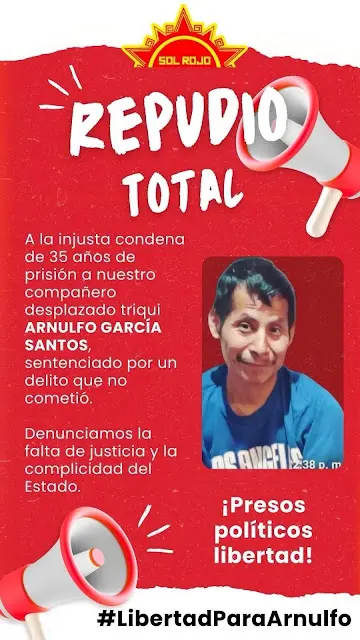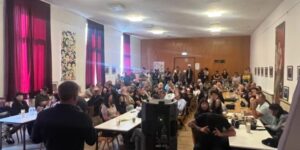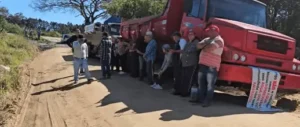
Mexico: Weekly Newsletter
We hereby share an unofficial translation of thepart on Mexico of the latest Weekly Newsletterpublishedpublished by Sol Rojo.
There is a popular saying that goes: “the soup falls from the plate to the mouth,” and this is what happens to all the governments that have emerged from the self-proclaimed “fourth transformation.” In Mexico City, ahead of the 2026 FIFA World Cup, Clara Brugada’s opportunistic government is doing everything it can to impose the “holy will” of monopoly capital. The indigenous peoples of Santa Úrsula Coapa and San Lorenzo Huipulco have been organizing since the announcement of the World Cup, whose games will be held in Mexico, the US, and Canada, respectively. Residents and local authorities in these areas denounce that the World Cup will bring with it greater dispossession of water and public spaces, coupled with the displacement of the population, the cancellation of public services, the loss of jobs and, clearly, an increase in organized crime. The opportunistic government of Mexico City talks a lot about “dialogue and democracy,” but it has closed all avenues for dialogue and canceled the right to consultation as a democratic exercise for the population. According to a report by Desinformémonos, the current Secretary of Government of the City, Cesar Cravioto, canceled two meetings with residents, prompting protests to resume on Sunday, September 7, in front of the Azteca Stadium, where illustrators, visual artists, activists, street vendors, and the general public painted murals and put up posters in rejection of this new imposition.
In Puebla, students from the Carmen Serdán Rural Normal School in Teteles began a day of protests demanding the immediate dismissal of the school’s director, Brenda Inés Nájera Torres, and the head of teacher education, whom they accuse of harassment, threats, and bullying against the students. They also demand a resolution to the situation of external students who are enrolled by the government in the Normal School but do not participate in the institution’s self-sustaining activities, including the boarding school, which takes away space from low-income young women from rural areas who want to study but do not have the opportunity due to limited enrollment. On September 2, just as the teacher students were holding a sit-in near Casa Aguayo (the seat of the Ministry of the Interior), the regime sent in infiltrators who started fires, thereby justifying the intervention of the State police and the Mexican army, who arrested and beat 140 teacher students from Teletes and 35 more from Ayotzinapa, who were later released. After that, the opportunistic government of Alejandro Armenta Mier launched a media campaign demonizing the students of the teacher education college and their organization, the Federation of Socialist Peasant Students of Mexico (FECSM), once again pointing to the dark dream of the reaction in Mexico: the closure of rural teacher education colleges, accused of being “nests of guerrillas.” In response, FECSM comrades launched a national mobilization, sending reinforcements to Puebla, who have also denounced harassment and criminalization by the State government, in addition to demonstrating in front of the Federal Ministry of the Interior in Mexico City, accompanied by representatives of the National Coordination of Education Workers (CNTE).
In Oaxaca, various grassroots organizations have denounced the climate of repression that has been growing since August, ranging from the use of riot police to repress the Unique Union of Community Telebachillerato Workers of the State of Oaxaca and the Front of Oaxacan Organizations, to the political imprisonment of poor peasants and community members who defend the land and forests. The cases of Pablo López Alavez, an indigenous Zapotec from the Sierra Norte sentenced to 30 years in prison, and Arnulfo García Santos, an indigenous Triqui displaced from San Miguel Copala sentenced to 35 years in prison on September 3, illustrate the situation. Both cases involve fabricated crimes that they did not commit, with the interests of large landowners in the background, and are clear examples of the logic of justice in the era of the “4T, Fourth Transformation” (very similar to the PRI era). When we talk about the Morena governments, it is no surprise to anyone that their leaders renounce their social democratic past (they always boast, “I come from the movement,” but no one remembers them on the barricades, working for the revolution or facing repression in prison or exile). It is necessary to build a United Front to confront the war against the people!


